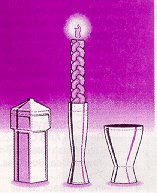 ‘Havdalah,’ which is Hebrew for “separation, ” is a ceremony where a blessing is said with wine, candles and spices to mark the end of Shabbat The “separation “shows the distinction between Shabbat and the other days of the week. This traditional ceremony goes as far back as the fourth and fifth century B. C. E. All members of the family participate in this ritual.
‘Havdalah,’ which is Hebrew for “separation, ” is a ceremony where a blessing is said with wine, candles and spices to mark the end of Shabbat The “separation “shows the distinction between Shabbat and the other days of the week. This traditional ceremony goes as far back as the fourth and fifth century B. C. E. All members of the family participate in this ritual.
The Ceremony
The Havdalah ceremony takes place in the evening after Shabbat ends on Saturday when three stars appear in the sky. It can be held either indoors or outdoors depending on personal preferences and the weather. Participants stand in a circle close together. Three ritual items are necessary for this traditional ceremony: the cup of wine, a braided candle, and a spice box. Each one symbolizes a significant part of Judaica.
Spice Box, Braided Candle, Cup of Wine
Cup of Wine
At the start of the Havdalah ceremony, a new week is welcomed as a blessing is recited over a full cup of wine. This cup of wine symbolizes joy, peace and happiness. Some people fill the cup to overflow as a sign of good omen and an expression of hope for the week to come. The sweet taste of the wine represents the feelings of being united together as Jews at the close of Shabbat.
The prayer is the same as the Shabbat kiddush except that it also has to do with separation of the Sabbath from the work week. The wine is not tasted until the Havdalah ceremony has ended.
Barukh Atah Adonai Eloheinu Melekh Ha Olam Bo-re P’ri Hagafen.
Blessed art Thou O Lord Our G-d, Ruler of the Universe, who has created the fruit of the vine.
![]() Braided Candle
Braided Candle
The ceremony continues with the lighting of the special braided candle. As the blessing refers to G-d being the creator of the lights of fire, the candle has more than one wick. Two separate candies was used in the past but nowadays a single braided candle with a double wick is most commonly used. One interpretation of using the special braided candle is the interweaving of Jewish people and humanity. The light of the Havdalah candle reflects hope for a positive impact on the world within the coming week.
Barukh ata Adonai Eloheinu melekh ha-olam bo-re m’orei ha-esh
Blessed art Thou, O Lord Our G-d, Ruler of the Universe, who has created the lights of fire.
As the blessing is recited, hands are extended towards the candle with palms facing inwards. One is to observe the light of the candle through the reflection of their fingernails. The reason for this is because Jewish tradition discourages saying blessings over things that we do not use. By doing such, one shows that he is making use of the light and receiving pleasure from it. The shadows show the distinction between light and darkness, indicating that the Sabbath day has come to an end.
 Spices
Spices
The blend of spices is unique to Havdalah. According to Rabbinic legend every Jew receives an additional soul with the peace of Shabbat. When this extra soul departs, the soul remaining goes through a sort of depression state. The enjoyable scent of the spice box as it is shaken and passed around the Havdalah circle, revives the soul and is an attempt to cheer it up for the week to come. The spices raise up the spirits and gives people the energy boost to face everyday life problems ahead.
Banrukh ata Adonai Eloheinu Melekh ha-olam bo-re minei v’samim.
Blessed art Thou, O Lord Our G-d, Ruler of the Universe who has created diverse spices.
End of Ceremony
Upon the closing of the Havdalah ceremony, a bless is recited affirming distinctions in all part of our lives.
Barukh ata Adonai Eloheinu melekh ha-olam, hamavdil bein kodesh I’hol, bein or l’hoshekh, bein Yisrael la-amin, bein yom hash’vi-i I’sheshet y’mei hama’aseh. Barukh ata Adonai, hamavdil bein kodesh l’hol.
Blessed art Thou, O Lord Our G-d, Ruler of the Universe who distinguishes between sacred and secular, light and darkness, Israel and other peoples, the seventh day the six days of labor. Blessed art Thou, O Lord, i distinguishes between sacred and secular.
The cup of wine is then passed around the circle. (Custom says that if a woman drinks from the wine, she grow a mustache). After the blessings have been recited the wine can be tasted. As the following passage said, the candle gets extinguished with the remaining wine.
Hamavdil bein kodesh I’hoi, hatoteinu hu yimhol, zarenu v’khaspenu yarbeh khahol, v;khakokhavim balaila.
May the One who separates the sacred and profane forgive our sins and make us as secure and as numerous as grains of sand and the stars at night.
Good Wishes to All
After the Havdalah candle is extinguished, the folly verse is said to one another: SHAVUA TOV! (GOOD WEEK!) Participants meet and greet each other blessings for a good week, a week of peace.
Family Time
Following Havdalah, families can use this time to reconnect with one another and share stories and expectations for the coming week. It can be used for play, study, or for relaxation. Havdalah is a special time and should be shared with special people.





